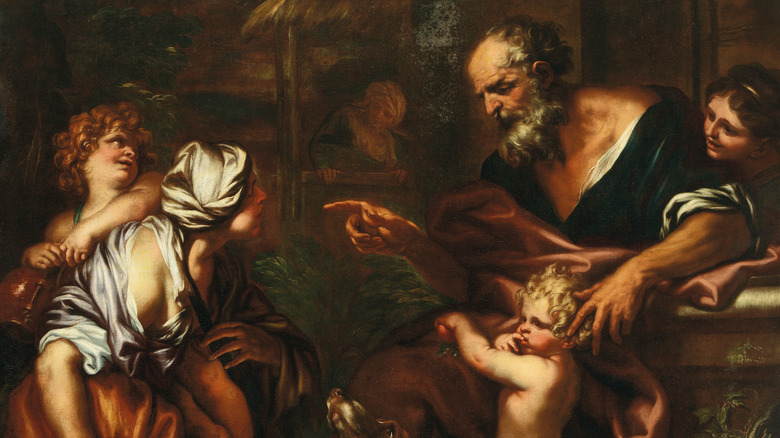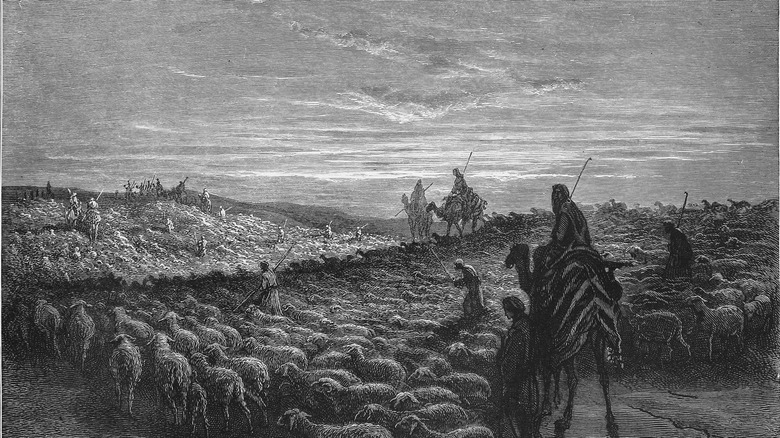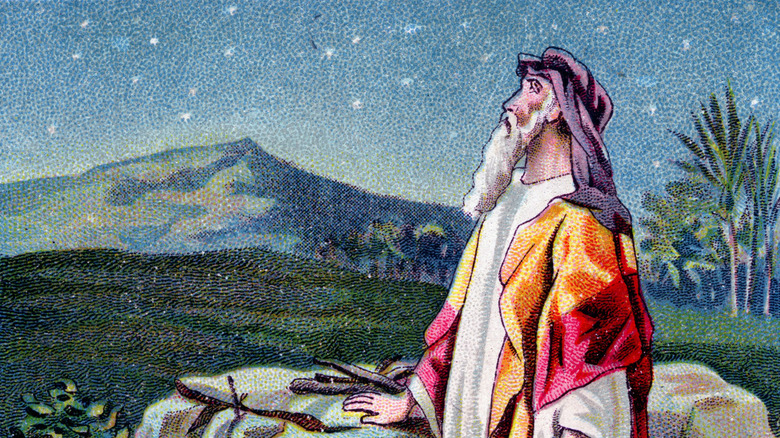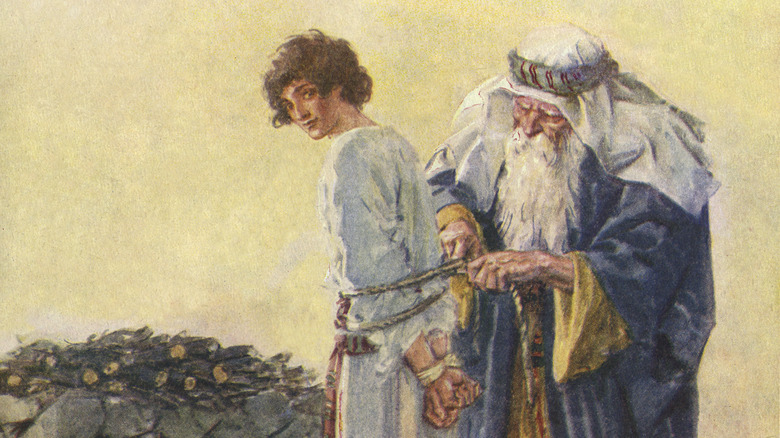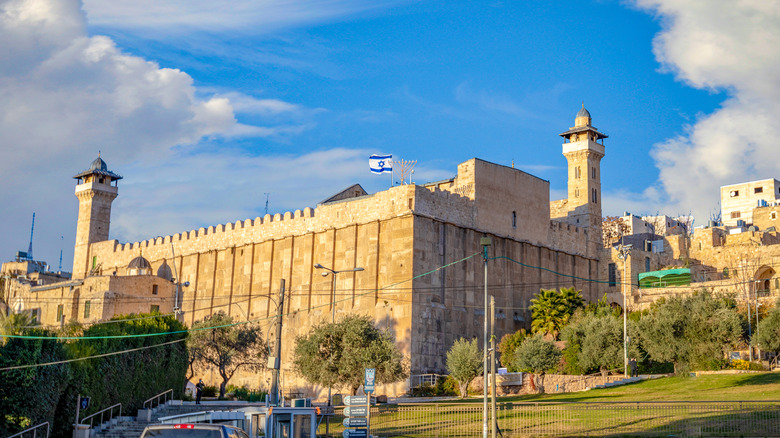The Untold Truth Of Abraham From The Bible
Believed to have been born nearly 4,000 years ago, the figure of the patriarch Abraham first appears in the Book of Genesis in the Hebrew Bible and lived a nomadic life after leaving his birthplace of Ur, Mesopotamia. And over the course of hundreds of years, the story of his life and deeds grew to be key to three major monotheistic religions: Judaism, Christianity, and Islam.
In Genesis, we are told: "Abraham lived to be 175 years old. He breathed his last breath and died at an old age. He had lived a long and satisfying life" (via Bible.com). Despite Abraham's apparent longevity and the incredible significance of his position as a forebear of three world religions whose name is still invoked millennia after his death, the details of his life are impossible to verify historically, Britannica notes. This is a notable contrast to what Biblical historians have been able to do so with the life of Jesus.
Though historical evidence for the existence of Abraham is likely irrecoverable, Genesis gives us a detailed account of his life and deeds, beginning when he was aged 75 and told by God: "I will make your name great, and you will be a blessing. I will bless those who bless you, and whoever curses you I will curse; and all peoples on earth will be blessed through you" (via World History Encyclopedia).
Abraham and his family thus undertook a journey to the promised land, which took them to Canaan, where Abraham set up an altar to God. However, experts differ on the exact conception of God that patriarchs such as Abraham would have worshipped.
Yahweh ... or El?
One of the reasons that Abraham differed from his fellow Mesopotamians was his rejection of the idea that there were multiple gods, each to be worshipped in their own way as was practiced in Abraham's native Ur. Traditionally, Abraham is considered the first monotheist who set the template for the major religions of humanity as they are practiced today. However, there are some incongruities in this account.
According to Britannica, there are conflicting sources concerning how Abraham's view of God ought to be characterized. In Chapter 14 of Genesis, the patriarch is said to give praise to "the Lord God Most High," a phrase traditionally associated with Yahweh, who in the Bible is the national God of Israel. His name notably came to be one of the seven names of God in the Hebrew Bible.
However, while the "Yahwistic source" claims that this is the name to which Abraham was referring, the "Priestly source" argues that this is chronologically impossible, as the name Yahweh only came into being when it was revealed to Moses (per Britannica). The outlet points out that experts believe the name of the deity Abraham revered was known as El — the God of the Canaanites that Abraham would have adopted on his arrival. El is also one of the seven names of God in Judaism, but at the time of Abraham's arrival in Canaan, experts claim that the existence of numerous gods was accepted and that El was revered above all.
Abraham was a word-of-mouth hero
William G. Dever uses his book "What Did the Biblical Writers Know, and When Did They Know It?" to argue that "while the Hebrew Bible in its present, heavily edited form cannot be taken at face value as a history in the modern sense, it nevertheless contains much history." Dever explains that the five books of the Hebrew Bible known as the Pentateuch "constitute a sort of 'pre-history' that has been attached to the main epic of ancient Israel by later editors" (via Internet Archive).
Dever argues that the lives of Abraham and his family were unlikely to have been passed down directly by chroniclers but were probably "distilled" from oral traditions hundreds of years after their deaths. In "The Historicity of the Patriarchal Narratives: The Quest for the Historical Abraham," Thomas L. Thompson similarly warns against the historicization of the Book of Genesis, arguing that the name of Abraham would have circulated widely in around the region he purportedly lived and died — though in many different forms (via Internet Archive).
Why did God ask Abraham to sacrifice Isaac?
According to the Hebrew Bible, Abraham's second son, Isaac, was born when the patriarch was 100 years old. Abraham and his wife, Sarah, had been waiting for a child and believed that Sarah was barren (Abraham's first son, Ishmael, was born by Sarah's Egyptian handmaiden, or slave, Hagar, according to Britannica). Given the couple's advanced age, the arrival of baby Isaac was therefore considered a gift from God, who was rewarding Abraham for his unshakeable faith and obedience.
However, the story that unfolds after the birth of Isaac has become one of the most controversial and widely debated in the whole of theology. Known as "The Binding of Isaac," the tale claims that God asks Abraham to sacrifice his beloved son. The typical explanation given by believers is that it was a test of Abraham's faith, and, of course, Isaac does not die, as an angel sent by God stopped the patriarch at the crucial moment. In doing so, God was signaling to Abraham that Isaac would indeed become the "seed" of a great nation. But the Christian faith has another reading and points to the Epistle to the Hebrews, which claims Abraham went to sacrifice Isaac with full knowledge that he would be resurrected — which he was, "figuratively speaking," per Hebrews 11:17-19 (via Biblia).
The truth of Abraham's grave
When Abraham's life finally came to an end, he was buried by his sons, Ishmael and Isaac, in the cave of Machpelah, which in time would come to be the final resting place of many of the patriarchs and matriarchs: Isaac, Jacob, Sarah, Rebecca, and Leah, as noted by AP News' Alma Rutgers. Rutgers also notes that in Jewish mysticism, the cave of Machpelah is believed to be the entrance to the Garden of Eden and the grave of the ultimate patriarch and matriarch: Adam and Eve.
The cave of Machpelah is located on what is today called the West Bank, which has for generations been the site of deadly violence between Israeli and Palestinian forces, whose respective Jewish and Muslim faiths are both said to be derived from Abraham himself. That such Holy site should bear witness to such horrors is one of the most pressing socio-political dilemmas of our time. Academics such as J. Kristen Urban have noted that though both Judaism and Islam share the story of Abraham (via Manchester University), interpretation varies wildly between the two faiths. Urban describes how some academics have posited that the opening up of a shared political narrative may constitute a step towards reconciliation and that in the right conditions, there might emerge an "opening for exploring the religious narratives of two brothers separated in their youth."
